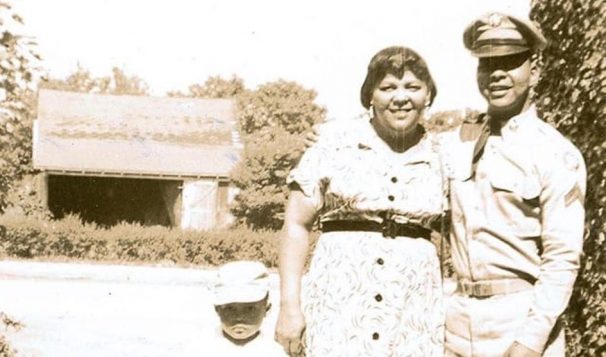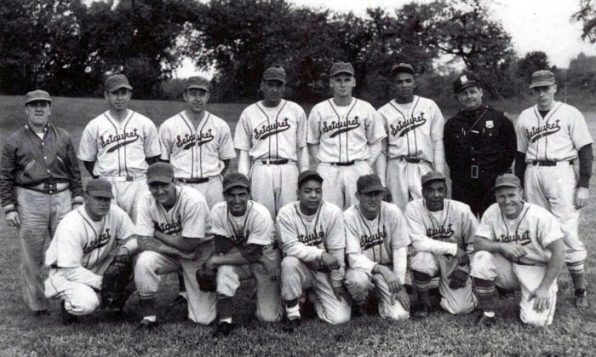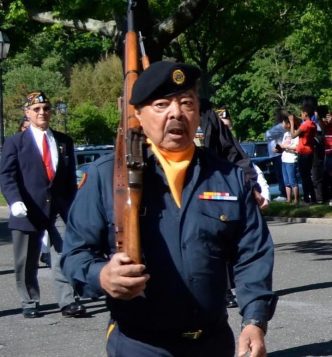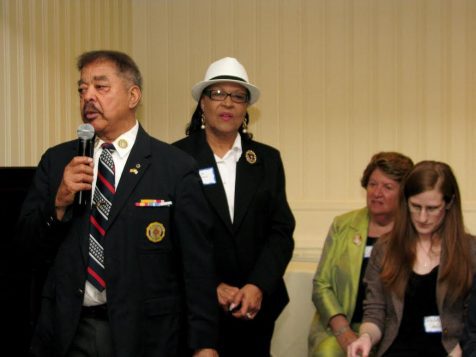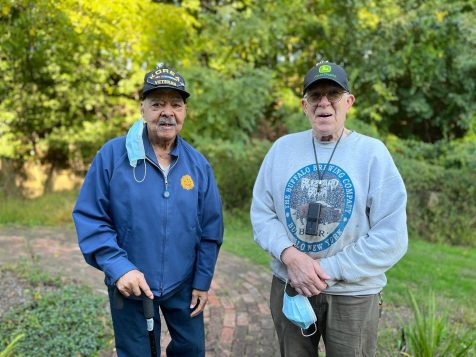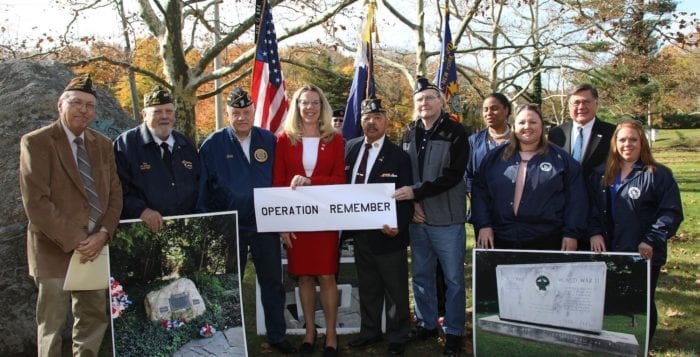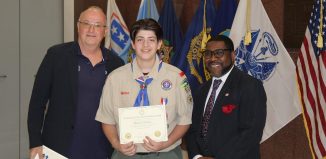Veteran Stories: Setauket’s Army vet Carlton Edwards experienced the desegregation of U.S. armed forces
By Rita J. Egan
Setauket and Stony Brook residents know if they want to learn about local history, they can turn to Carlton Edwards, known by many as Hub. However, Edwards, 93, is more than a local history lover — he was also a part of history. A veteran of the Korean War, he served during the early years of desegregation in the armed forces.
Segregation in the armed forces was banned in 1948; however, it took a few years before the military was integrated. Edwards’ outfit was one of the first to be desegregated, he said, and the veteran trained and served with people from different backgrounds and nationalities including Filipino, Korean, Chinese and American Samoa. He said everyone got along well.
His brother-in-law, who served in 1950, was with an all-Black unit. When Edwards, who is also part Native American, sent him a letter including a photo of himself and his fellow soldiers, his brother-in-law asked him, “What army are you in?”
Hub wrote back, “I’m in the United States Army. The same as you.”
The road to Korea
Born in Stony Brook, Edwards was only a few years old when his family moved to Chicken Hill, a neighborhood in Setauket. He was known in the area for his athleticism as a baseball player, pitching for the school’s varsity baseball team in 8th grade. In 11th grade, he continued pitching for the school and a local semi-pro team.
In 1951, at the age of 21, he received two draft notices — one from the United States Armed Forces and the other from the Brooklyn Dodgers after the team heard of his three no-hitters. The baseball milestones occurred while playing for his high school team, the Setauket Suffolk Giants and Setauket Athletic Club.
Despite the stroke of luck potentially to play professional baseball, Edwards had no choice but to join the army during draft time.
“Uncle Sam took first precedent,” he said.
Edwards added he wasn’t alone in the community. “Most of the young men that I went to school with all ended up in the service.”
Before joining the army, all he knew was the Three Village area. After stops in Camp Kilmer, New Jersey, and Camp Stoneman, California, he was put on a boat to Honolulu, Hawaii, where he trained.
The veteran, who served from 1951 to 1953, said the Schofield Barracks they slept in while training in Hawaii were nice but still had bullet holes from the Pearl Harbor attack in 1941. After training in Hawaii, his unit headed to Busan, Korea. He said it was a different world than what he knew. His unit worked with injured soldiers, helping them get to hospitals in Japan, or even home.
“That’s why I never talk about it because I saw a lot of wounded,” the veteran said.
Growing up and attending Bethel AME Church in Setauket regularly when he was younger helped Edwards keep his faith when he served. He still wears the cross he had in the army. “Even with the dog tags, I kept it on,” he said.
Despite what he experienced in Korea, Edwards feels the military provides much-needed discipline for young people.
“If you’ve been in the service, you learn how to take orders,” he said.
Being raised by a strict mother and grandmother, Edwards said he already possessed discipline when he joined the army. Edwards said he missed his family while away from Setauket and looked forward to receiving letters from his mother and grandmother as well as family members, friends and a girl he was dating at the time. “In fact, I still have some of those letters,” he said.
Life after Korea
After his time in the army, where he began as a private first class and ended his service as a corporal, Edwards returned to Chicken Hill. He carried the memories from his service, and while teaching Sunday School at Bethel AME Church for 20 years, Edward said he tried “to teach peace for your fellow man.”
Soon after his return home, he met and married Nellie Sands. The couple bought a house in West Setauket and had two sons.
Edwards, a retired custodian for the Three Village Central School District, where he worked for 40 years, has been an active member of the Three Village Historical Society. Before the pandemic, he would greet guests at the society’s Chicken Hill: A Community Lost to Time exhibit every Sunday to answer visitors’ questions.
Edwards has also been a member of the American Legion Irving Hart Post 1766 since 1953. For decades, he has participated in parades, memorial services and other veteran events locally as well as in Washington, D.C., Rochester, Buffalo and all over Long Island to represent his post. He said being a member has allowed him the opportunity to meet veterans who fought in different wars through the decades.
In the early days, some members had fought in World War I and World War II. Edward said Nelson Combs, an early member of the post who was Black, had to fight in the French army during World War I because he was unable to sign up for the armed forces in the United States. Combs went on to receive the Croix de Guerre, which is comparable to the U.S. Bronze or Silver Star.
Joe Bova, who has volunteered with Edwards at the Three Village Historical Society and conducted research with him for the Chicken Hill exhibit, is currently working with the veteran on the renovation of the Irving Hart Post. Bova said his friend developed a lot of empathy while serving.
“He really felt strongly about what his commitment to people should be and that just transferred over to the community that he belongs to,” Bova said. He also credits Edwards with being actively involved with the Irving Hart post since he returned from Korea, recruiting members and playing a major part in the current renovations and plans for the post’s future.
Recognition
Edwards isn’t sure if he will be able to attend Setauket’s Memorial Day Parade this year, but he said it’s always touching when veterans are acknowledged.
“Every veteran appreciates it when people recognize that you have served your country,” he said. “It makes you feel good that people appreciate what you did.”
As for his athletic accomplishments, those haven’t been forgotten either. On May 18, he was inducted into the Suffolk Sports Hall of Fame for those three no-hitters in his pre-war days.

